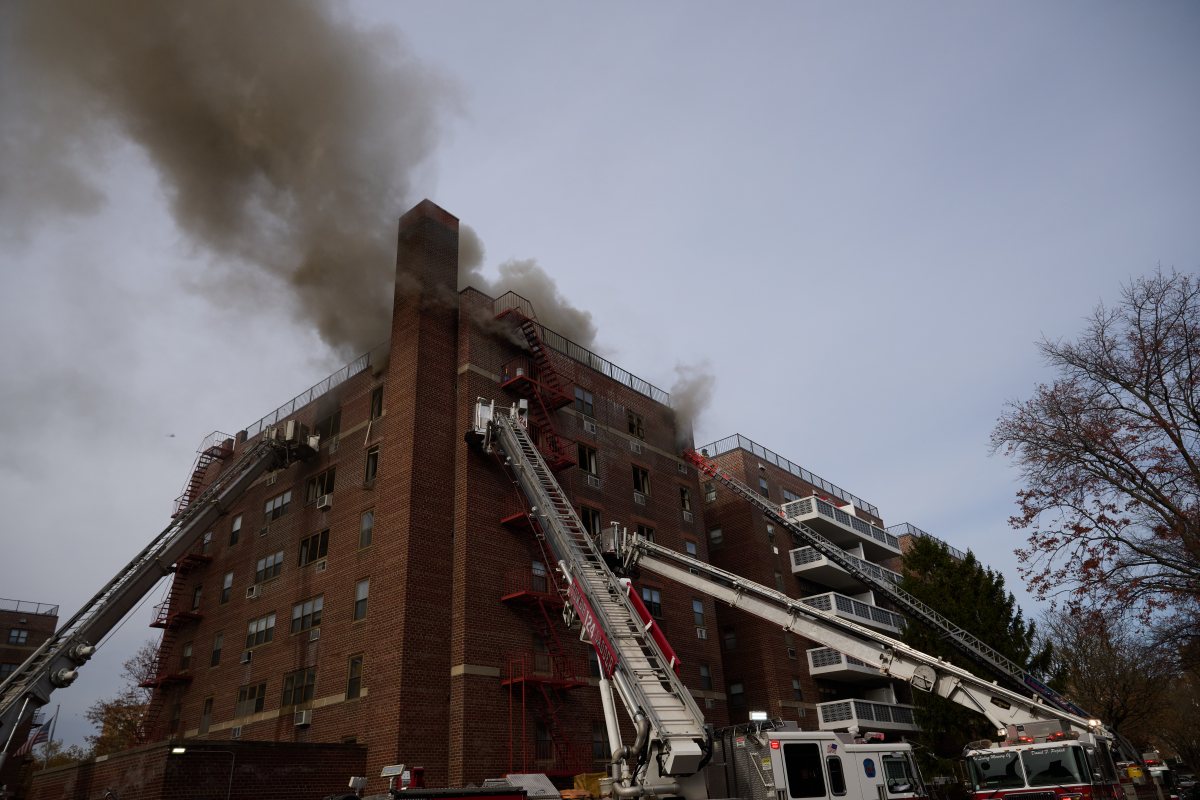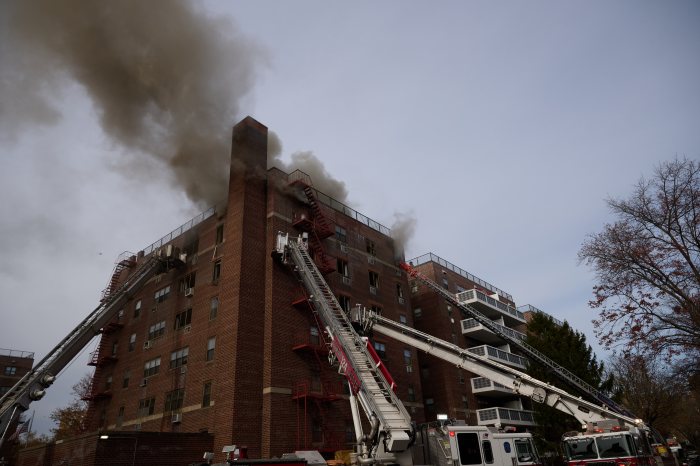By Aline Reynolds
Marilyn Berdugo, 37, was born and raised in the East Village and is not willing to move elsewhere.
“This is my home. This is what I have,” she said of her two-bedroom apartment at 390 E. Eighth St. Berdugo, unemployed, relies on disability payments to keep up with the $600 monthly rent.
If the rent increased, she said, she could become homeless.
Berdugo is one of three incensed residents in the building, near Avenue D, that might be forced out of their apartments this year. Late last month, the building’s 35 units were contracted to be sold to East Village realtor Tower Brokerage, which is offering the tenants $200,000 per apartment and is willing to finance the property’s outstanding debts. Bob Perl, Tower’s president, assured that the apartments of the three tenants wishing to stay in the building would remain rent-stabilized.
But the city has plans to foreclose on the property next month, since the building — owned by a nonprofit Housing Development Fund Corporation — has accrued a slew of tax debt and fines for violations that the H.D.F.C. can’t afford to repay. Were the foreclosure to occur, the city would hand over the building’s ownership and management to a third-party organization, rather than to the H.D.F.C.
The city’s priority in the process is to keep low-income housing intact, according to Eric Bederman, a spokesperson for the New York City Housing Development Corporation.
“Our intent through a third-party transfer is to select a qualified and experienced developer who has the resources and ability to do whatever rehabilitation work is necessary, and to keep the units affordable,” he said. The selected organization, he said, would also be responsible for paying off the property’s debt.
But Tower Brokerage’s Perl sees it differently. He says the $200,000-per-apartment buyouts are a jackpot for the building’s tenants, who are all low-income, with many of them eager to buy a home elsewhere in the city, he said.
Should the foreclosure occur, he explained, they would remain low-income tenants.
“This is their main asset in life — it’s their only opportunity to make this kind of money,” he said of the buyout he and his partners are offering.
According to Perl, most of the tenants agree with him.
“We’ve lived here forever, we managed the building, and we were entitled to get our apartments,” said Hyder Binjameel, who claims to be the president of the 390 E. Eighth St. H.D.F.C. board.
The three tenants wishing to stay put have filed a complaint with state Attorney General Eric Schneiderman, requesting he block the sale from going forward.
The residence, currently comprised of 35 affordable housing units, must be preserved as low-income, according to Harvey Epstein, director of the community development project at the Urban Justice Center, a nonprofit legal advocacy organization which is advocating for the three tenants.
The transfer to Tower would violate the H.D.F.C. board’s responsibilities, Epstein charged in a Feb. 24 letter to the state Attorney General’s Office. The H.D.F.C. board, he claims, agreed that the building should remain low-income housing.
“This sale…allows tenants, who have relied on government-assisted low-income housing, to profit from this benefit provided by the taxpayers,” Epstein wrote.
Chris Kui, executive director of Asian Americans for Equality, or AAFE, which claims to have the majority vote on the Eighth St. building’s H.D.F.C. board, deems the Tower Brokerage sale to be fraudulent.
“It’s not right — it’s turning a public asset into luxury condos in selling it speculatively to anyone on the market,” Kui said. “These people are very deceptive — they want to be able to sell it, make the money and walk away,” he said of Perl and his partners.
The conversion of the building from low-income to market-rate would alter its character and have a negative impact on the neighborhood as a whole, said Jennifer Vallone, a housing director at University Settlement, which also opposes the Tower Brokerage sale.
“It wouldn’t be an advantage to the community as a whole to lose low-income units to gentrification,” she said.
Councilmember Rosie Mendez is also opposing the Tower deal.
“I’m against the sale to someone who would empty out the building and make it a luxury building,” said Mendez, who insists 390 E. Eighth St. must stay permanently affordable.
But Perl argues that the building was freed of mandatory affordable housing status in 1996, according to a 1981 city deed. The city’s objective in setting up an H.D.F.C. to begin with, he and Binjameel said, was for the building’s tenants to eventually gain ownership of their apartments.
“The whole purpose is that tenants could live in these apartments, be low-income for a set period of time, and afterward be free-market,” Perl said.
If the city goes ahead with its plans to foreclose on the building, he said, “it’s taking money away, keeping a group of people impoverished and forcing people to be low-income in order to fill their ideological mandate.”
Tenant Michael Diez, a handyman who has lived in the building for three decades, said he is eager to move out of the neighborhood, and that the Tower deal would allow that.
“We need a change,” Diez said, speaking for himself and his wife and children. The sale, he said, could translate into a big down payment for a house in Queens or the Bronx.
Mendez and the other opponents of the sale claim, however, that the transaction itself is invalid, since Binjameel and the other tenants never belonged to the H.D.F.C. board.
AAFE, a nonprofit minorities advocacy group, is now claiming its rights to the property, claiming it has the majority of seats on the H.D.F.C.’s board. Starting in 2005, AAFE and Binjameel, representing the tenants, engaged in a legal battle regarding the control of the board. That dispute, however, never got resolved.
“Mr. Binjameel represented he had authority to represent the H.D.F.C.,” Epstein said. “However, according to Steven Gee, attorney for AAFE, Mr. Binjameel has no such authority and therefore can not bind the corporation to any such sale.”
Added Thomas Yu, AAFE’s director of affordable housing, “How can you [authorize a sale] when you have no legal standing to do that? It’s like saying, ‘I’m selling you the Brooklyn Bridge.’ You can’t sell something you don’t own.”
The Attorney General’s Office would not comment on the legitimacy of the Tower Brokerage sale. Before the sale goes through and is finalized, though, it must first be approved by the city’s Department of Housing Preservation and Development, after which the H.D.F.C. board — purportedly headed by Binjameel — must file an application with the A.G.’s Office, which also must give its consent.
If the attorney general O.K.’s the application, the H.D.F.C. would then seek final approval from New York State Supreme Court.
In the interest of keeping the units affordable, Epstein said the H.D.F.C. under AAFE would not agree to rent or sell any of the units to anyone except low-income dwellers.
“The sale of the property violates the corporation purposes, because it provides a benefit to individual residents and not the corporation,” Epstein says in his letter.
The building was supposed to be converted into a co-op, but never did because of unmet financial obligations and ongoing litigation between AAFE and the tenants. The building owes the city roughly $1.25 million in real estate taxes, according to Perl, and inherited a $3 million injured worker’s lawsuit; $300,000 in water and sewage bills; and potential Department of Buildings violation fines amounting to $300,000.
In the meantime, the few tenants against the sale, like Janette Brown, 40, will do anything they can to be able to stay in their homes as low-income tenants.
Brown hopes to live there until she dies, when her lease would then be transferred to her currently 22-year-old son.
“Everybody’s being so greedy — they want money to get out of here, and they don’t think about the future of the people that have been here for a long time,” she said.
“I’m not going to Brooklyn or the Bronx,” Brown said. “I’m going to live here among the rich people.”




































